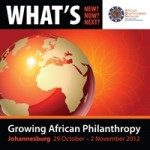 The opening plenary of day two of the African Grantmakers Network Assembly, held 29 October to 2 November in Johannesburg, South Africa, focused on youth – or, more specifically, on the relationship between elders and youth. Former President of Mozambique Joaquim Chissano explained that as a child his earliest notions of injustice had been that he was unable to eat the same food as that enjoyed by his white contemporaries at the school he was privileged to attend (as the only black pupil). It struck me that, unwittingly perhaps, the former president had succinctly explained the challenge facing Mozambique and, indeed, much of Africa.
The opening plenary of day two of the African Grantmakers Network Assembly, held 29 October to 2 November in Johannesburg, South Africa, focused on youth – or, more specifically, on the relationship between elders and youth. Former President of Mozambique Joaquim Chissano explained that as a child his earliest notions of injustice had been that he was unable to eat the same food as that enjoyed by his white contemporaries at the school he was privileged to attend (as the only black pupil). It struck me that, unwittingly perhaps, the former president had succinctly explained the challenge facing Mozambique and, indeed, much of Africa.
‘It’s our turn to eat’ was a refrain I heard in Kenya in December 2007 from some of the less cautious opposition supporters hungrily eyeing the demise of the Kikuyu-led government. Ideology was noticeable by its absence. Similarly, in the five years I’ve been in Mozambique what I’ve witnessed is a scramble for resources. Impressive macro-economic growth rates of 7 per cent pa suggest a country that is succeeding, yet Mozambique is marooned in the bottom few of the UNDP’s Human Development Report. Barely 12 per cent of the working age population has a waged job, and as much as 55 per cent of the population lives in poverty. Meanwhile, the property boom in Maputo is accompanied by a spread of services for the rich (private clinics and private schools) and a rash of high-end boutiques. The elites are obviously enjoying their new diet, but the masses are ignored.
President Chissano continued through his personal story to chart his politicization and radicalization, and the collective effort to free Mozambique from its oppressors. At the end of the plenary session he admitted, however, that today we appear to lack a vision, a shared view of what we’re working towards. It seemed to me that he was missing the glaring truth that too many of the ‘believers’ in the revolution had been sidelined by those who simply wanted to eat.
The second plenary of day two in a way addressed the same issue. Dr Mamphela Rampele, in a hugely impressive contribution, made the case that South Africa’s problems stem from a failure to complete the project of socio-economic engineering (when the apartheid political system was dismantled). Yao Graham agreed, stating boldly that the model of growth that most African states are pursuing is intensifying inequality and marginalization.
Again, I see this reflected so clearly in Mozambique. What we do have in common, if not a shared vision of social justice, is a pattern of exploitation. It is not just foreign multinationals that are investing in Mozambique; it’s as likely to be BBBEE (broad-based black economic empowerment) companies from South Africa joining with black Mozambican elite-owned companies to exploit new opportunities in telecoms, media, oil and gas.
In the first plenary of the day, a participant had declared that we had reared a generation of ‘spineless young people’. The lady was talking about children similar to her own who had ‘no life beyond iPads and fancy phones’. That is no doubt true for many children of the newly wealthy middle class, but in Mozambique the 70 per cent or so of young people who lack any form of regular work or education are far from spineless. There’s nothing spineless about unpaid labour in the fields, or walking from office to office to deposit a CV, or hanging around a builder’s merchants in order to earn coins from carrying cement. Similarly, it’s not spineless to hit the streets and challenge the state over lack of jobs or high food prices. Just as colleagues from Egypt stressed the role of young people in their revolution, it is likely that sooner or later disaffected youth in other parts of Africa will lose patience with the ‘inherited engineered inequality’ (Dr Rampele).
What role for philanthropy in all of this? Although one speaker reminded us that ‘philanthropy will not resolve the problem; what is needed is redistribution of wealth’, the consensus in these two plenaries seemed to be that philanthropic efforts should focus mostly on civic education, on laying the foundations for social justice. I think that’s right. Too much philanthropy continues to be of the sticking plaster variety, delinked from any sense of political project. We need to pump resources into a new struggle for liberation, led by active informed citizens simply demanding a better stake in the new Africa. At the same time, we need to tackle the drivers of the economy, the markets, and restructure an economic system that, as Dr Graham said, serves only to exacerbate inequality.
Andrew Kingman works with MICAIA Foundation on programme development and here writes in his personal capacity.





Comments (0)